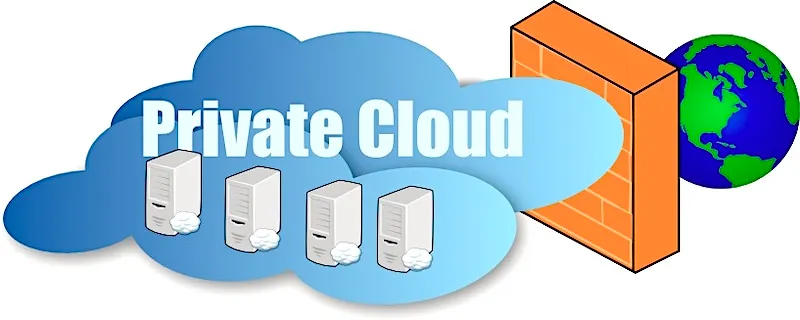A private cloud is a cloud that only one organization can access. Private clouds offer the benefits of cloud computing without the perceived security risks of a public cloud.
What is a private cloud?
A private cloud is a cloud service exclusively offered to one organization. By using a private cloud, an organization can experience the benefits of cloud computing* without sharing resources with other organizations.
A private cloud can either be inside an organization or remotely managed by a third party and accessed over the Internet (but unlike a public cloud, it is not shared with anyone).
*Cloud computing is hosting computational services in remote servers that can be accessed over the Internet.
Private cloud vs. public cloud
Think of public cloud computing as being like a laundromat. Typically, a laundromat has enough machines for everyone to do the laundry they need, even though multiple strangers share it.
A private cloud is like a laundromat that belongs to just one person, and only that person can access it. In this way, the owner can run as many loads of laundry as they need and be assured that no one else has access to their laundry.
Private and public clouds use cloud technologies like virtualization and share characteristics such as scalability and broad access. The main difference between them is that multiple customers of the cloud vendor can access a public cloud, while a private cloud is only accessible to one organization.
Is it better to use a public cloud or a private cloud?
Some businesses may prefer to use a private cloud, especially if they have extremely high-security standards. Using a private cloud eliminates intercompany multitenancy (there will still be multitenancy among internal teams). It gives a business more control over the cloud security measures that are put in place.
However, it may cost more to deploy a private cloud, especially if the business is managing the private cloud themselves. Organizations that use private clouds often end up with a hybrid cloud deployment, incorporating some public cloud services for efficiency.
What is a hosted private cloud?
Suppose a large Chicago, Illinois, company wants to run a private cloud. They can either set up an internal private cloud in their Chicago office building or let a third-party cloud provider host their private cloud. That third party may be in a different area of Chicago, another city in Illinois, or even another state.
A hosted private cloud is off-premise instead of on-premise, meaning the cloud servers are not physically located on the grounds of the organization’s use. Instead, a third party manages and hosts the cloud remotely.
What is an internal private cloud?
As described above, an internal private cloud is hosted on an organization’s premises and is managed by them internally. Unlike with a hosted private cloud, the organization manages and operates the internal private cloud themselves. Typically, this means they will purchase the servers, keep them up and running, and administer the software that runs on the servers.
How is an internal private cloud different from a traditional on-premise data center?
An internal private cloud is hosted on a company’s premises, managed by that company, and accessed only by that company. In some ways, an internal private cloud is similar to a traditional data center.
However, an internal private cloud is architected with cloud technology; private cloud servers will run virtual machines to maximize the use of the hardware. As a result, private clouds are usually more efficient, more powerful, and more scalable. If a private cloud can be compared to owning one’s laundromat, a traditional data center is like a single in-home washer and dryer.
In addition to virtualization, internal private clouds have these qualities that traditional data centers don’t have:
- Scalability: Internal private clouds easily scale up, meaning they provide more services without any extra configuration by an IT team.
- Self-service: Users can access the private cloud without IT assistance.
- Broad access: All teams can access the cloud resources they need.
- Measurable: IT can measure how much storage and bandwidth is used and how many user accounts are active and allocate cloud resources accordingly.
How are private clouds related to hybrid clouds? What about multi-cloud?
Hybrid clouds combine private clouds and public clouds. A hybrid cloud can also include legacy on-premise (non-cloud) infrastructure.
“Multi-cloud” refers to a combination of multiple public clouds. A multi-cloud deployment can also be hybrid if it includes a private cloud but doesn’t necessarily include one. (Learn more about multi-cloud.)





